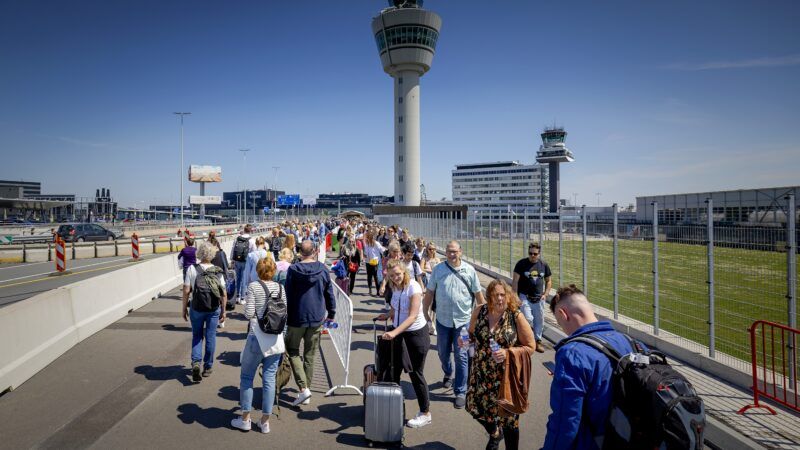CDC Will Stop Forcing Travelers To Present Negative COVID Tests To Reenter U.S.
The policy, which only applied to people entering the country by air, not by land, was always ill-conceived. Good riddance.

In February, I crossed the border between Mexico and the U.S. by foot, reentering California from Tijuana. I presented my passport but no negative COVID test. Last week, when I reentered Texas from Mexico by air, coming from the southern state of Oaxaca, I had to upload a negative COVID test to the airline's document portal before I would be allowed on the plane or into the country, per U.S. government policy. Two different policies for two different forms of crossing between the same two countries. Make it make sense.
Thankfully, the Biden administration is expected to announce today, per reporting by CNN, that the Centers for Disease Control and Prevention (CDC) will be revoking the policy that has heretofore forced all air travelers to the U.S.—citizens and noncitizens alike—to present proof of a negative COVID test prior to entry.
The policy, which has been in place since January 2021, may still be reinstated if CDC officials deem the public health situation changed due to the emergence of new variants. Officials have indicated that they will review after 90 days and possibly reverse course. It had formerly required travelers to test within 72 hours of entry into the country; now it requires travelers to test one day in advance of entry. (The U.S. still requires that foreigners who enter the country be vaccinated, with some exceptions.)
This is a welcome change for airline lobbyists, who have expressed concern that the testing policy is hindering foreign interest in traveling to America; representatives for the nonprofit U.S. Travel Association have estimated that this policy change could bring in up to $9 billion in additional spending in 2022. It's also a welcome change for many international travelers, due to the time and money costs of acquiring a test abroad: Last summer, I paid 60 euros ($63) plus taxi fare to book it to the Metropolitan Hospital of Athens for a test prior to reentering the U.S. (on par with French prices, per Matt Welch's reporting). I paid roughly the same at a hospital in Mexico City a month later. Last week, my clinic-administered test in Oaxaca only cost me about $20, but they messed up my email, so I didn't get my results back from that clinic.
These are small prices to pay when weighed against the larger costs of airfare and lodging, but multiply each of these by a few travelers per family. Consider the time costs of sorting this out, the issues that may result in you needing to hector pharmacy personnel in a language you don't speak very well, or the fact that you paid money but did not receive a test result.
All for what? To keep COVID out of the country?
COVID already spreads cyclically inside the U.S., suppressed somewhat by high rates of vaccination and prior infection, with its effects now further blunted due to the use of antiviral therapy Paxlovid. If the U.S. were attempting to pursue a "zero COVID" policy akin to China's—which comes with state-administered quarantine camps, horrible deprivation of civil liberties, and economic costs seen and unseen—the border testing policy would perhaps make sense; but it's not, and even keeping COVID-positive people off planes isn't a policy the U.S. government has seriously pursued (or else it would've instituted the same types of testing requirements for domestic air travel as well).
The new policy will go into effect at midnight on Sunday. Like with many other COVID-related policies that have lag times between policy announcement and effective-by date, it's unclear why travelers must wait even two more days instead of being allowed to end this nonsensical practice immediately. For travelers who enter the U.S. today or tomorrow, tough luck.
